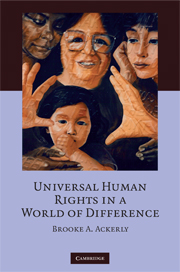Book contents
- Frontmatter
- Contents
- Acknowledgments
- 1 Universal human rights in a world of difference: challenging our thinking
- Part I Epistemology, diversity, and disagreement in theory and practice
- Part II A methodology for immanent theory
- 5 Feminist curb cutting: a methodology for exposing silences and revealing differences for the immanent study of universal human rights
- 6 Listening to the silent voices, hearing dissonance: a methodology for interpretation and analysis
- Part III Immanent universal human rights: theory and practice
- Bibliography
- Interviews
- Index
5 - Feminist curb cutting: a methodology for exposing silences and revealing differences for the immanent study of universal human rights
Published online by Cambridge University Press: 06 July 2010
- Frontmatter
- Contents
- Acknowledgments
- 1 Universal human rights in a world of difference: challenging our thinking
- Part I Epistemology, diversity, and disagreement in theory and practice
- Part II A methodology for immanent theory
- 5 Feminist curb cutting: a methodology for exposing silences and revealing differences for the immanent study of universal human rights
- 6 Listening to the silent voices, hearing dissonance: a methodology for interpretation and analysis
- Part III Immanent universal human rights: theory and practice
- Bibliography
- Interviews
- Index
Summary
Prologue
On a 2004 trip to India for the World Social Forum and to see grantees of the Global Fund for Women, Susan Okin observed two kinds of women's rights activism – one focusing on specific demands and another focusing on the consciousness of one's right to make those demands. Unfortunately, our conversation with Okin about her observation of women's rights activism and what normative implications could be drawn from it was cut short by her premature death. This chapter is about how theorists should go about drawing normative insights from those critically affected by the political problems on which we reflect.
Introduction
Normative, social scientific, and experienced-based analyses are all crucial to the task of political theory that is engaged with the “struggles and wishes of the age.” Normative analysis turns our attention to the theoretical roots of contemporary political problems and provides a normatively defendable solution that we might actively work toward politically. Social scientific analysis elucidates the processes that constitute the historical material conditions of contemporary political puzzles. This same sociological analysis helps explain the political, social, and economic obstacles to realizing a particular normatively defendable solution. Experienced-based analysis helps us focus our normative analysis on a theoretical puzzle as it is lived by those particularly adversely affected by the problem and such analysis can suggest context-appropriate possibilities for advancing social justice and expanding human freedom. Critical theorists call this “praxeological” inquiry.
- Type
- Chapter
- Information
- Universal Human Rights in a World of Difference , pp. 127 - 153Publisher: Cambridge University PressPrint publication year: 2008



